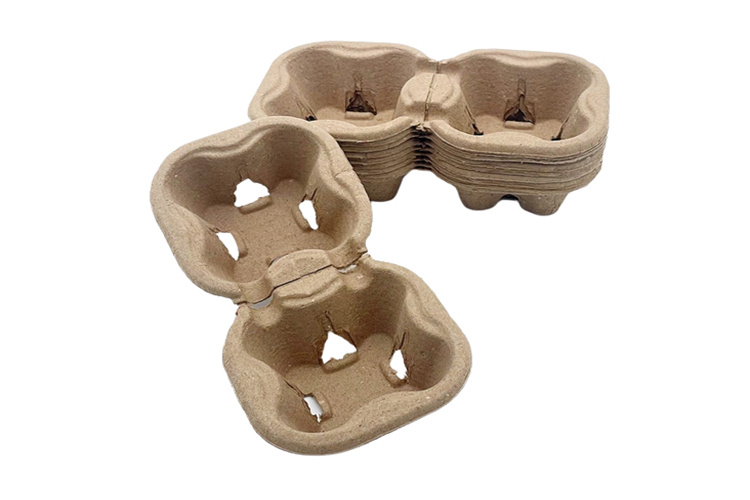In today’s world, the urgency to address environmental concerns has reached unprecedented levels. The rise of consumer awareness and the demand for sustainable practices have driven industries to rethink their approaches.
One significant area where change is not just possible but essential is packaging. Molded pulp packaging, a revolutionary solution, is playing a crucial role in reducing carbon footprint.
In this article, we’ll explore how molded pulp packaging contributes to a greener planet, its benefits, and why it stands out as the future of sustainable packaging.
Understanding Molded Pulp Packaging
Molded pulp packaging is created using recycled paper, cardboard, and other natural fibers. Unlike traditional plastic packaging, molded pulp is biodegradable, compostable, and recyclable.
It is molded into various shapes and sizes to protect and support products during transportation and storage. From egg cartons to electronic packaging, molded pulp has found its way into numerous industries, offering a sustainable alternative to conventional packaging materials.
The Environmental Impact of Traditional Packaging
Traditional packaging, primarily plastic, has a severe impact on the environment. Plastic production relies heavily on fossil fuels, contributing to greenhouse gas emissions.
Moreover, plastic waste accumulates in landfills and oceans, causing long-term environmental damage. According to recent studies, over 10 million tons of plastic enter the oceans each year, harming marine life and ecosystems.
Carbon Emissions from Plastic Production
The production of plastic packaging is energy-intensive. It involves extracting and refining oil, a process that releases a substantial amount of carbon dioxide (CO2) into the atmosphere. The entire lifecycle of plastic, from production to disposal, significantly contributes to global carbon emissions.
Waste Management Challenges
Plastic waste management is another pressing issue. Most plastics are non-biodegradable, taking hundreds of years to decompose. Ineffective waste management systems lead to plastic pollution, further exacerbating environmental degradation. The incineration of plastic waste releases toxic chemicals, adding to air pollution and health hazards.

How Molded Pulp Packaging Reduces Carbon Footprint
Molded pulp packaging by reliable companies like BonitoPak offers a sustainable solution to the environmental challenges posed by traditional packaging materials. Here’s how it helps in reducing carbon footprint:
1. Utilization of Recycled Materials
Molded pulp packaging is primarily made from recycled paper and cardboard, reducing the demand for virgin materials. By repurposing waste paper products, it helps divert waste from landfills and minimizes the need for deforestation. This recycling process consumes less energy compared to the production of new materials, thereby lowering carbon emissions.
2. Energy-Efficient Production Process
The manufacturing process of molded pulp packaging is energy-efficient. It involves pulping the recycled materials, forming them into molds, and drying them using minimal energy. Unlike plastic production, which relies on high temperatures and complex chemical processes, molded pulp production is relatively straightforward and consumes less energy.
3. Biodegradability and Compostability
One of the most significant advantages of molded pulp packaging is its biodegradability. Once disposed of, it decomposes naturally within a few months, leaving no harmful residues.
This contrasts sharply with plastic, which can persist in the environment for centuries. Additionally, molded pulp packaging can be composted, returning valuable nutrients to the soil and supporting natural ecosystems.
4. Reduction in Transportation Emissions
Molded pulp packaging is lightweight yet durable, reducing the overall weight of shipments. This weight reduction leads to lower fuel consumption during transportation, resulting in decreased carbon emissions. The compact nature of molded pulp packaging also allows for efficient stacking and space utilization, further optimizing transportation logistics.
5. Minimal Environmental Impact
From production to disposal, molded pulp packaging has a minimal environmental impact. It avoids the release of toxic chemicals and pollutants associated with plastic manufacturing and disposal. Furthermore, the water used in the production process can be recycled and reused, reducing water consumption and minimizing wastewater generation.

Advantages of Molded Pulp Packaging for Businesses
Adopting molded pulp packaging offers numerous benefits for businesses aiming to enhance their sustainability efforts:
1. Meeting Consumer Demand
Today’s consumers are increasingly eco-conscious, favoring brands that prioritize sustainability. By adopting molded pulp packaging, businesses can align with consumer values, enhancing brand loyalty and reputation.
2. Compliance with Regulations
Governments worldwide are implementing stricter regulations on plastic usage and waste management. Molded pulp packaging helps businesses comply with these regulations, avoiding potential fines and penalties.
3. Cost-Effective Solution
While the initial investment in molded pulp packaging may be higher than plastic, it proves cost-effective in the long run. The reduced environmental impact, lower transportation costs, and potential tax incentives make it a financially viable option.
4. Versatility and Customization
Molded pulp packaging can be tailored to fit various products, offering versatility and customization. Whether it’s delicate electronics, fragile glassware, or bulky items, molded pulp can be designed to provide optimal protection.

Case Studies: Success Stories of Molded Pulp Packaging
1. Apple Inc.
Apple has been a pioneer in adopting sustainable packaging solutions. The company has transitioned to molded pulp packaging for several of its products, significantly reducing its plastic footprint. Apple’s commitment to sustainability has set a benchmark for other tech companies to follow.
2. Nestlé
Nestlé, a global food and beverage leader, has incorporated molded pulp packaging in its product lines. By doing so, the company has achieved substantial reductions in plastic waste and carbon emissions, contributing to its overall sustainability goals.
The Future of Packaging: Embracing Molded Pulp
As the world continues to grapple with environmental challenges, the packaging industry must evolve towards sustainable practices. Molded pulp packaging offers a viable and eco-friendly alternative to traditional materials, playing a crucial role in reducing carbon footprint. Businesses that embrace this innovative solution not only contribute to a greener planet but also position themselves as leaders in sustainability.
Conclusion
Molded pulp packaging represents a significant step towards a sustainable future. Its ability to reduce carbon footprint, combined with its environmental benefits and business advantages, makes it a compelling choice for industries worldwide.
By choosing molded pulp packaging, businesses can make a positive impact on the environment, meet consumer expectations, and pave the way for a more sustainable world. The time to act is now, and molded pulp packaging is leading the charge toward a greener tomorrow.
If you want a wide variety of molded pulp packaging or need any more information about our sustainable packaging solutions, you should get in touch with us today.



